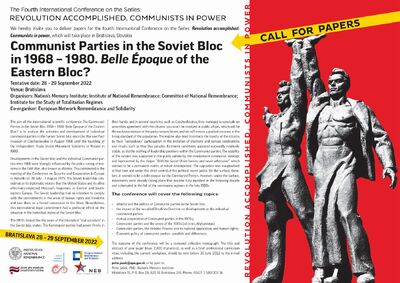Organisers: Nation´s Memory Institute (Slovakia); Institute of National Remembrance (Poland); Committee of National Remembrance (Hungary); Institute for the Study of Totalitarian Regimes (Czech Republic)
Co-organiser: European Network Remembrance and Solidarity
The aim of the international scientific conference The Communist Parties in the Soviet Bloc 1968 – 1980. Belle Époque of the Eastern Bloc? is to analyse the activities and development of individual communist parties in the former Soviet bloc since the Warsaw Pact invasion of Czechoslovakia in Augusta 1968 until the founding of the Independent Trade Union Movement Solidarity in Poland in 1980.
Developments in the Soviet bloc and the individual Communist parties after 1968 were strongly influenced by the policy easing of tensions in the Cold War, also known as détente. This culminated in the meeting of the Conference on Security and Cooperation in Europe in Helsinki on 30 July - 1 August 1975. The Soviet leadership considered as its diplomatic victory that the United States and its allies effectively-respected Moscow's hegemony in Central and Southeastern Europe. Commitments in the areas of human rights and freedoms, which it did not intend to abide by, were seen as a forced concession of the West. Nevertheless, this international legal commitment had a profound effect on the situation in the individual states of the Soviet bloc.
The 1970s looked like the years of the triumph of "real socialism" in the Soviet bloc states. The Communist parties had power firmly in their hands, and in several countries, such as Czechoslovakia, they managed to conclude an unwritten agreement with the citizens: you won't be involved in public affairs, which will be the exclusive domain of the party nomenclature, and we will ensure a gradual increase in the living standard of the population. The regime also tried to enforce the loyalty of the citizens by their "compulsory" participation in the imitation of elections and various celebrations and rituals, such as May Day parades. Economic conditions appeared outwardly relatively stable, as did the staffing of leadership positions within the Communist parties. The stability of the system was supported in the public sphere by the omnipresent communist ideology and represented by the slogan "With the Soviet Union forever and never otherwise!", which seemed to be a permanent reality of future development. The opposition was marginalised at that time and under the strict control of the political secret police. On the surface, therefore, it seemed to be a belle époque for the Communist Parties. However, under the surface, movements were already taking place that became fully manifest in the following decade and culminated in the fall of the communist regimes in the late 1980s.
The conference will cover the following topics:
- détente and the politics of Communist parties in the Soviet bloc;
- the impact of the so-called Brezhnev Doctrine on developments in the individual communist parties;
- mutual cooperation of Communist parties in the 1970s;
- Communist parties and the crises of the 1970s (oil crisis, Afghanistan);
- Communist parties, the Helsinki Process and its national application, and human rights;
- Economic policy of communist parties - parallels and differences.
The outcome of the conference will be a reviewed collective monograph. The title and abstract of your paper (max. 2,400 characters), as well as a brief professional curriculum vitae, including the current workplace, should be sent before 30 June 2022 to the e-mail address:
or by post to:
Peter Jašek, PhD.
Nation's Memory Institute
Miletičova 19 P. O. Box 29
820 18 Bratislava 218
Phone: 00421 2 593 003 36
 E-Księgarnia
E-Księgarnia